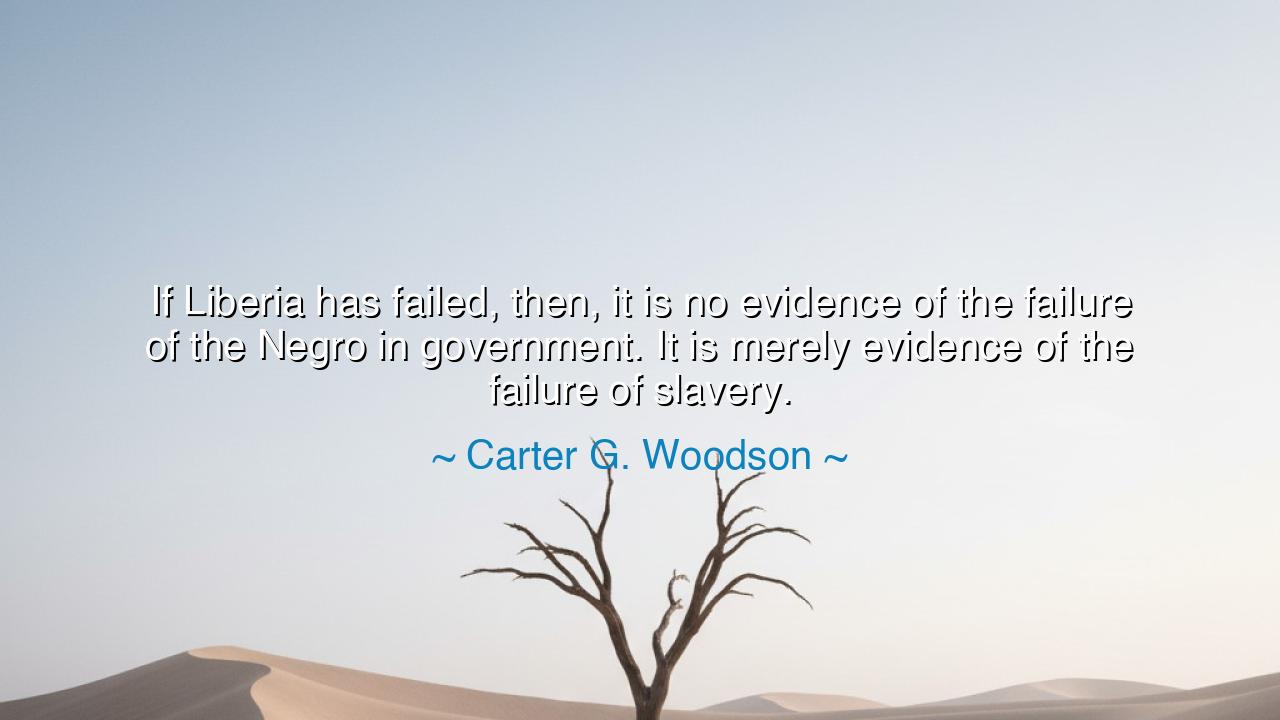
If Liberia has failed, then, it is no evidence of the failure of
If Liberia has failed, then, it is no evidence of the failure of the Negro in government. It is merely evidence of the failure of slavery.






Host: The room is dimly lit, the evening light fading slowly as the world outside becomes quieter. The soft hum of the city feels distant, almost nonexistent, as the quiet warmth inside seems to settle. Jeeny is sitting on the couch, her legs tucked beneath her, lost in thought as she stares at a book she’s not really reading. Jack stands near the window, his arms crossed, a faraway look in his eyes. The air feels heavy with an unspoken question, a sense that something is about to shift between them.
Jeeny: “I came across something today, Jack,” she says softly, her voice breaking the silence. “It’s a quote from Carter G. Woodson. He said, ‘If Liberia has failed, then, it is no evidence of the failure of the Negro in government. It is merely evidence of the failure of slavery.’ What do you think of that?”
Jack: He turns slightly, raising an eyebrow, his brow furrowing in thought. “Liberia? I mean, I get what he’s trying to say, but it feels like a pretty heavy statement. The failure of a whole country — and to tie it to slavery like that? It’s a bold claim. I’m not sure it fully adds up. It’s not like slavery is the sole reason a country might struggle or fail, right?”
Jeeny: “But I think what Woodson is really getting at is deeper than just Liberia as a nation. He’s speaking to the legacy of slavery, the systems it created, and the way it has impacted not just individuals, but entire countries, cultures, and governments. Liberia was founded by formerly enslaved Africans, so when we look at its struggles, it’s important to understand the lasting effects of what slavery did — not just in terms of freedom, but also in terms of infrastructure, education, and even governance.”
Host: The air between them feels thick with the weight of Jeeny’s words. Jack seems to be processing them slowly, his posture shifting slightly as he begins to consider a different perspective. Outside, the last light of the evening wanes, the stillness outside mirroring the reflective nature of the conversation.
Jack: “So, you think that the struggles of Liberia aren’t necessarily a reflection of the people or their ability to govern, but more about the systems that were in place long before they even had a chance at freedom? That slavery didn’t just affect the individuals, but it had a broader impact on how entire nations could function?”
Jeeny: She nods slowly, her gaze focused, her tone gentle but firm. “Yes, exactly. Slavery didn’t just enslave people — it created systems of oppression, destruction, and imbalance. When you build a society on forced labor, on treating a whole group of people as subhuman, you’re not just robbing them of their freedom; you’re robbing them of the tools to build a thriving society. Slavery left behind a legacy of inequality, disempowerment, and even internalized oppression that continues to affect nations and people today.”
Host: The room feels quiet now, the weight of Jeeny’s explanation hanging in the air like a heavy truth. Jack, usually quick to speak, seems unsure of how to respond, as though the depth of what she’s said is sinking in.
Jack: “I hadn’t really thought about it that way. It’s not just about freedom, but about rebuilding everything after you’ve been systematically destroyed for generations. Maybe it’s not fair to judge the ability of a people or a government based on what happened after they were freed, especially when the systems of slavery left so much damage in its wake.”
Jeeny: “Exactly. That’s what Woodson is saying. Just because a nation or group of people struggles doesn’t mean they aren’t capable. It means they’re dealing with the aftermath of something much larger than themselves. It’s about understanding the depth of that history, and how hard it is to rebuild when you’ve been torn down for so long.”
Host: The room feels still, almost as if time itself has slowed to allow them both to reflect. Jeeny’s perspective seems to have opened up a new way of looking at history, not as a series of isolated events, but as a deep, interconnected narrative of struggle, legacy, and endurance. Jack seems to be realizing the truth in her words, the layers of complexity that exist in the history of people, nations, and systems.
Jack: “So it’s not just about seeing Liberia’s struggles as a failure, but about understanding the long-term impacts of slavery, and how deeply that affects the ability to govern, to build, to thrive. It’s about recognizing that the failure isn’t in the people, but in the systems that were put in place to ensure that success was impossible.”
Jeeny: “Yes. And it’s not just about Liberia. It’s about every place and every person who has been oppressed and forced into a system that was never meant to help them succeed. The failure of slavery is the failure of a system that was built to destroy people’s ability to build their own futures.”
Host: The quiet of the evening seems to settle in with a weight of its own, as if the conversation has unlocked something deeper. The world outside continues on, but inside, there’s a stillness — a shared understanding of how history doesn’t just affect the past, but shapes the present and future. Jack and Jeeny sit together, each reflecting on how deeply the legacy of slavery is embedded in the structures around them. In this moment, it feels as though they’ve both grasped a bit more of the complexity of history, and how we must approach it with deep understanding and compassion.






AAdministratorAdministrator
Welcome, honored guests. Please leave a comment, we will respond soon